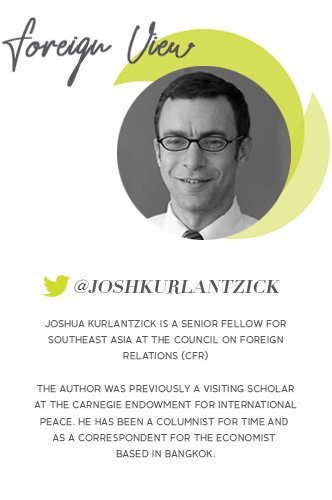
Congress has in recent years played an outsized role in Southeast Asia policy in part because recent U.S. administrations paid less attention to the region than they did during the Cold War, and in part because there were prominent congressional leaders who took a close interest in Southeast Asia. Senate Majority Leader Mitch McConnell and his staff, for instance, have been major players in U.S. policy toward Myanmar for decades now.
Now, it is somewhat unclear which congressional leaders will play major roles in Southeast Asia policy. In the House, Congressman Joseph Crowley of New York, who lost in the Democratic primary, will not be serving in the next Congress. He was known as having major interest in Southeast Asia, and having a staff that was extremely informed about Southeast Asia. Similarly, Congressman Ed Royce of California, who is retiring and did not contest this election, also was a prominent voice on Southeast Asia issue, and wielded power as head of the House Foreign Affairs Committee. (His former staffer, Young Kim, ran for his seat, and she was leading the race at the time this article was written; she could be a prominent new voice on Asia issues.) Another representative who historically took an interest in Southeast Asia, Dana Rohrabacher of California, also lost in the election.
Meanwhile, the probable new head of the Senate Foreign Relations Committee, Idaho Senator Jim Risch, is generally more of an unknown quantity on many foreign policy issues than the senator he will replace as committee head, Bob Corker of Tennessee. The more obscure Risch’s views on a range of issues related to Indonesia are not known at this point, while Corker had amassed extensive foreign policy experience. As Thomas Hill of the Brookings Institution has noted, Risch has not even been that publicly active on the committee, sponsoring only one piece of legislation.
However, there are several prominent advocates of U.S. ties to Southeast Asia remaining in the Congress, and some newly elected members who have extensive Southeast Asia experience and could take an interest in the region. Among those who remain in Congress and are devoted to U.S.-Southeast Asia relations include Ted Cruz, senator from Texas, Ann Wagner, a congresswoman from Missouri, Ted Yoho, a congressman from Florida, and Joaquin Castro, a congressman from Texas, among others. Incoming congressman Tom Malinowski, who was elected in New Jersey, is a longtime human rights specialist who served as Assistant Secretary of State for Democracy, Rights, and Labor during the Obama administration and has extensive Asia experience. And, of course, McConnell remains majority leader in the Senate, although he has historically taken more interest in mainland Southeast Asia than in Indonesia.
At the same time, however, the transitional period in the Congress will probably cause even more gridlock in U.S. policymaking, a gridlock that will extend to congressional activity on areas of foreign policy. Such gridlock could include dysfunction over budgeting, including the military budget and the foreign aid budget, among other areas.
In addition, the continued gridlock in Congress, combined with the president’s seeming desire to push forward with his tough approach to trade, make it relatively likely that the White House will continue turning the screws on China on trade issues. Growing trade combat between Beijing and Washington will endanger all Asian economies, including Indonesia and others in Southeast Asia. A Democratic House is unlikely to have much impact on Trump’s trade policies, including a potentially harsher trade policy toward China. And the House may try to press for close scrutiny of any White House attempts to negotiate trade deals with the Philippines or Vietnam, on human rights grounds.
Meanwhile, in the House Democrats likely will try to shift the focus of the Foreign Affairs Committee to other issues that have relevance in Indonesia. As I have written, the subcommittee on Asia and the Pacific likely will try to hold more hearings, and focus more attention, on nontraditional security issues including climate change and combating terrorism, both of which are important to Indonesia. The Democrats in the House are unlikely to challenge Washington’s increasingly close defense ties with Jakarta, although they may push the Trump administration to make clearer how it plans to operationalize the Free and Open Indo-Pacific concept.

